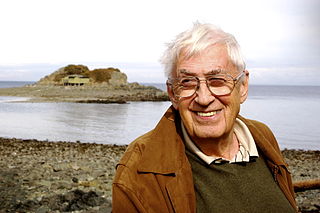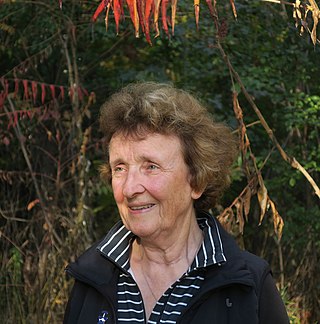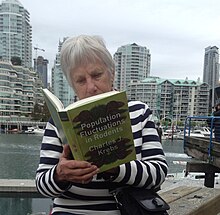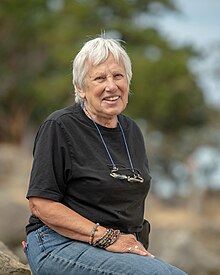
Crawford Stanley "Buzz" Holling, was a Canadian ecologist, and Emeritus Eminent Scholar and Professor in Ecological Sciences at the University of Florida. Holling was one of the conceptual founders of ecological economics.

May Roberta Berenbaum is an American entomologist whose research focuses on the chemical interactions between herbivorous insects and their host plants, and the implications of these interactions on the organization of natural communities and the evolution of species. She is particularly interested in nectar, plant phytochemicals, honey and bees, and her research has important implications for beekeeping.

Dolph Schluter is a Canadian professor of Evolutionary Biology and a Canada Research Chair in the Department of Zoology at the University of British Columbia. Schluter is a major researcher in adaptive radiation and currently studies speciation in the three-spined stickleback, Gasterosteus aculeatus.

Malacosoma californicum, the western tent caterpillar, is a moth of the family Lasiocampidae. It is a tent caterpillar. The Western Tent Caterpillar is found in southern Canada, the western United States, and parts of northern Mexico. There are currently six recognized subspecies of M. californicum. Western tent caterpillars are gregarious and will spend a large portion of their time with other caterpillars in silken tents constructed during their larval stage.
Loren H. Rieseberg is a Canadian-American botanist.
Sarah Perin "Sally" Otto is a theoretical biologist, Canada Research Chair in Theoretical and Experimental Evolution, and is currently a Killam Professor at the University of British Columbia. From 2008-2016, she was the director of the Biodiversity Research Centre at the University of British Columbia. Otto was named a 2011 MacArthur Fellow. In 2015 the American Society of Naturalists gave her the Sewall Wright Award for fundamental contributions to the unification of biology. In 2021, she was awarded the Darwin-Wallace Medal for contributing major advances to the mathematical theory of evolution.

Hugh David Loxdale is an entomologist. He was professor of ecology at the Institute of Ecology, University of Jena from 2009 to 2010, president of the Royal Entomological Society from 2004 to 2006, and honorary visiting professor at the School of Biosciences, Cardiff University. Loxdale works on the population biology, ecology, and genetics of insects, especially aphids and their wasp parasitoids.

Charles Joseph Krebs is a professor emeritus of population ecology in the University of British Columbia Department of Zoology. He is also Thinker-in-residence at the Institute for Applied Ecology at the University of Canberra, Australia. He is renowned for his work on the fence effect, as well as his widely used ecology textbook Ecology: The Experimental Analysis of Distribution and Abundance.
Leticia Avilés is an Ecuadoran evolutionary biologist and ecologist who studies the evolution of social behavior and the evolution of life history traits in metapopulations. Her methods include a combination of theory and empirical work, the latter using social spiders as a model system. Her research on these organisms has addressed questions such as why some spiders live in groups, why do they exhibit highly female-biased sex ratios, and why have they evolved a system where individuals remain in the natal nest to mate from generation to generation.

Margaret James Strickland Collins was an African-American child prodigy, entomologist (zoologist) specializing in the study of termites, and a civil rights advocate. Collins was nicknamed the "Termite Lady" because of her extensive research on termites. Together with David Nickle, Collins identified a new species of termite called Neotermesluykxi. When Collins earned her PhD., she became the first African American female entomologist and the third African American female zoologist.

Kathy Martin is a Canadian ornithologist who is an expert on arctic and alpine grouse and ptarmigan, and on tree cavity-nesting vertebrates. She is a professor in the Faculty of Forestry at the University of British Columbia and was a senior research scientist with Environment and Climate Change Canada.

Jessica Lee Ware is a Canadian-American evolutionary biologist and entomologist. She is the associate curator of invertebrate zoology at the American Museum of Natural History in New York City. In addition, she is a principal investigator at the Sackler Institute for Comparative Genomics and an associate professor for the Richard Gilder Graduate School.

Dawn R. Bazely is a full professor in biology in the Faculty of Science, and the former Director of the Institute for Research Innovation in Sustainability, at York University in Canada. In 2015 she was awarded the title of University Professor for services to research, teaching, and the institution. Bazely has been a field biologist for forty years and her research specializes in plant-animal interactions in ecology. She has also been recognized for her science communication.
Sarah E. Gergel is an American ecologist and professor in the Department of Forest and Conservation Sciences at the University of British Columbia (UBC), Canada. She is a landscape ecologist, known for her research linking landscapes and rivers, and her role in enhancing training in the practice of landscape ecology.
Therese Ann Markow is the Amylin Chair in Life Sciences at the University of California, San Diego. Her research involves the use of genetics and ecology to study the insects of the Sonoran Desert. She was awarded the Presidential Early Career Award for Scientists and Engineers in 2001 and the Genetics Society of America George Beadle Award in 2012. Her research received widespread attention for its alleged misuse of Native American genetic data.

Jean H. Langenheim was an American plant ecologist and ethnobotanist, highly respected as an eminent scholar and a pioneer for women in the field. She has done field research in arctic, tropical, and alpine environments across five continents, with interdisciplinary research that spans across the fields of chemistry, geology, and botany. Her early research helped determine the plant origins of amber and led to her career-long work investigating the chemical ecology of resin-producing trees, including the role of plant resins for plant defense and the evolution of several resin-producing trees in the tropics. She wrote what is regarded as the authoritative reference on the topic: Plant Resins: Chemistry, Evolution, Ecology, and Ethnobotany, published in 2003.

Lenore Fahrig is a Chancellor's Professor in the biology department at Carleton University, Canada and a Fellow of the Royal Society of Canada. Fahrig studies effects of landscape structure—the arrangement of forests, wetlands, roads, cities, and farmland—on wildlife populations and biodiversity, and is best known for her work on habitat fragmentation. In 2023, she was elected to the National Academy of Sciences.
Judith Elizabeth Mank is an American-British zoologist who is a Canada 150 Chair at the University of British Columbia. She studies how evolution produces variation in animals. She is interested in sexual dimorphism and the formation of sex chromosomes.

Zoya Fedorivna Klyuchko was a Ukrainian entomologist, lepidopterist, zoologist, professor and doctor of biological sciences. She focused on the research of faunistics; morphology; taxonomy and phylogeny of the scoop family Noctuidae, value as pests in rural areas plants and the role in nature in rare and disappearing insects. Klyuchko worked at the Taras Shevchenko National University of Kyiv, the I. I. Schmalhausen Institute of Zoology and the Pavlo Tychyna Uman State Pedagogical University and wrote between 130 and 160 scientific articles.

Professor Amy Angert is an evolutionary biologist, working in the Botany department and Biodiversity Research Centre of the University of British Columbia. Her research is known for pioneering experimental approaches to study species geographic distributions.

















